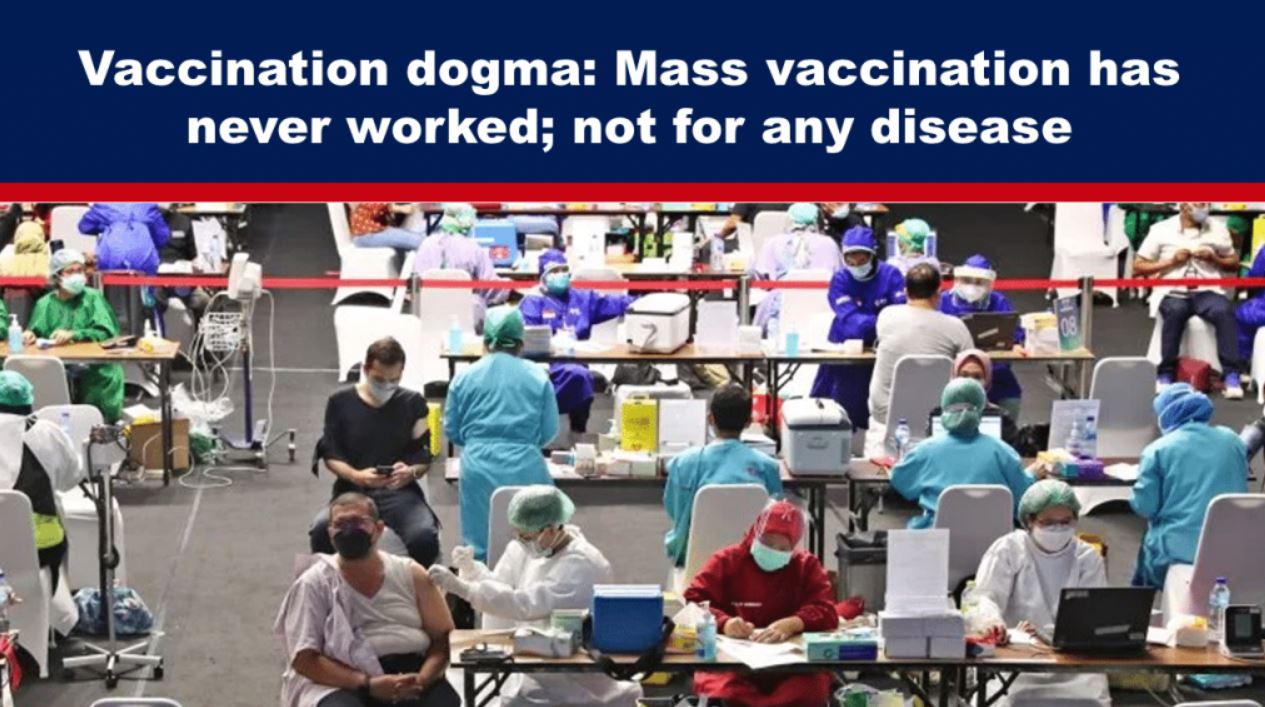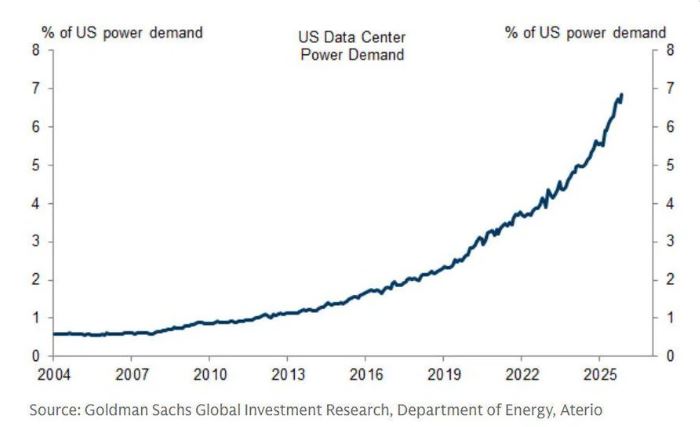Vaccination dogma: Mass vaccination has never worked; not for any disease
Unlike other high-income nations, the US has an aggressive approach to annual covid-19 boosters, recommending them for nearly everyone. A New England Journal of Medicine paper critiques this approach but the authors don’t question whether the vaccines help, harm or are even necessary.

Unlike other high-income nations, the US has an aggressive approach to annual covid-19 boosters, recommending them for nearly everyone. A New England Journal of Medicine paper critiques this approach but the authors don’t question whether the vaccines help, harm or are even necessary.
In the following, Roman Bystrianyk explains why mass vaccination is not necessary, and never has been. A handful of honest physicians have noted this for decades: what truly conquered infectious diseases wasn’t medical intervention but clean water, adequate nutrition and humane living conditions. “What actually saves lives [is] real, genuine health, which is something you can’t get in a pill or an injection,” he writes.
But, as Bystrianyk notes, the persecution of vaccine dissenters follows a pattern as old as vaccination itself. The medical establishment’s suppression of dissenting voices on vaccination began during Edward Jenner’s time.
Covid-19 and the Vaccination Dogma
“Unfortunately, a belief in the efficacy of vaccination has been so enforced in the education of the medical practitioner that it is hardly probable that the futility of the practice will be generally acknowledged in our generation, though nothing would more redound [contribute] to the credit of the profession and give evidence of the advance in pathology and sanitary science. It is more probable that when, by means of notification and isolation, small-pox is kept under control, vaccination will disappear from practice, and will retain only a historical interest.”[1]— Professor E. M. Crookshank, MRCS, Professor of Comparative Pathology and Director of the Bacteriological Laboratory, King’s College, London, 1889
“The medical practitioners remind me of a flock of sheep. When the leader starts to run in a certain direction, the whole flock follow without question, and the faster the leader runs, the more excited the rest become. Who can say absolutely that antitoxin ever cured a case of diphtheria? While, on the other hand, how many cases have we known of being left with a weak heart after it had been used…”[2] — Dr. B. H. Cubbage, 1908
“The problem is not the problem. The problem is your attitude about the problem.”― Jack Sparrow
A recent New England Journal of Medicine paper critiques the US’s aggressive, one-size-fits-all approach to annual covid-19 boosters – yearly covid-19 injections for essentially everyone – a policy unmatched by other high-income nations. While the authors acknowledge the programme’s overreach, they tacitly accept its permanence, sidestepping fundamental questions: Do these boosters actually help? Could they harm? Are they even necessary?
Prasad and Makary’s stance feels less like scientific rigour and more like political appeasement – a performative nod to Americans alienated by past bureaucratic overreach. The implied promise – “This time it will be different, we’ll do better!” – rings hollow when the underlying assumption remains unchanged: unquestioned faith in perpetual boosting.
“Over the past 5 years, the United States has moved toward an annual covid-19 booster program. Each fall, covid-19 booster shots are developed, alongside seasonal influenza vaccines, and are recommended for every American. As compared with vaccination policies in all European nations, the US policy has been the most aggressive. While all other high-income nations confine vaccine recommendations to older adults (typically those older than 65 years of age), or those at high risk for severe covid-19, the United States has adopted a one-size-fits-all regulatory framework and has granted broad marketing authorisation to all Americans over the age of 6 months.”[3]—Vinay Prasad, Martin A. Makary
Unfortunately, they refuse to question the foundational premise. By invoking “seasonal influenza vaccines” – with their 60-year history of universal promotion – they imply covid boosters should follow the same path. But what does the actual record show?
A damning 2023 paper by Morens, Taubenberger and Fauci admits the quiet part aloud: After six decades, flu vaccines have failed to control respiratory viruses. Their conclusion is devastating:
“As of 2022, after more than 60 years of experience with influenza vaccines, very little improvement in vaccine prevention of infection has been noted. As pointed out decades ago, and still true today, the rates of effectiveness of our best approved influenza vaccines would be inadequate for licensure for most other vaccine-preventable diseases … Taking all of these factors into account, it is not surprising that none of the predominantly mucosal respiratory viruses have ever been effectively controlled by vaccines … Durably protective vaccines against non-systemic mucosal respiratory viruses with high mortality rates have thus far eluded vaccine development efforts.”[4]—David M. Morens, Jeffery K. Taubenberger, Anthony S. Fauci
The data exposes this failure starkly:
- Mortality rates rose through the 1980s-90s despite 60-70% vaccination coverage in seniors.
- Two decades later, death rates merely returned to pre-vaccine levels – no net benefit.
- Even Fauci’s team concedes: durable protection against mucosal viruses remains impossible with current science.

Yet the medical establishment keeps pushing these failed interventions. Why? When the evidence shows decades of negligible, if any, positive impact, blind persistence becomes either delusion or dogma.
“Although the rapid development of multiple covid-19 vaccines in 2020 represents a major scientific, medical, and regulatory accomplishment,the benefit of repeat dosing – particularly among low-risk persons who may have previously received multiple doses of covid-19 vaccines, had multiple covid-19 infections, or both – is uncertain. The American people, along with many health care providers, remain unconvinced.”[5]—Vinay Prasad, Martin A. Makary
The passage begins by lauding the “rapid development of multiple covid-19 vaccines in 2020” as some grand triad of scientific, medical and regulatory achievement. But this triumphalism collapses under scrutiny. What exactly constituted this “major accomplishment”? The much-vaunted “science” was at best incomplete, at worst deliberately misleading – remember those hollow laughable mantras parroted endlessly: “I follow the science,” “working at the speed of science”? These empty slogans masked a disturbing reality: the wholesale abandonment of proper scientific rigour in favour of political expediency.
The true “medical accomplishment” appears to have been the unprecedented psychological conditioning of both healthcare professionals and the public. Through calculated language manipulation – rebranding experimental mRNA gene-altering technology as a traditional “vaccine” – authorities weaponised two centuries of public trust in vaccinations. This linguistic sleight-of-hand, combined with relentless fear-mongering, achieved remarkable compliance despite the absence of long-term safety data. The resulting iatrogenic harm remains largely unacknowledged by the very institutions that caused it.
Frankly, they played the public as suckers because they know after two centuries of brainwashing “safe and effective” they would do what they were told to do.
As for the “regulatory accomplishment,” we must ask: Is bypassing standard safety protocols truly something to celebrate? The Emergency Use Authorisation became not a measured response to a crisis, but a carte blanche to ignore established biological safeguards. Normal approval processes were jettisoned, long-term studies abandoned and critical questions about risk dismissed.
Most damningly, the fundamental premise remains unchallenged: Where is the conclusive evidence that these interventions provide a net benefit to any demographic? The assumption of benefit persists despite glaring gaps in the data. Rather than rigorous science, we see the same tired patterns – surface-level adjustments that maintain the status quo while avoiding substantive questions about efficacy, safety, or actual medical necessity.
“Over the past two seasons, uptake of the annual covid-19 booster has been poor, according to the Centres for Disease Control and Prevention (CDC). Less than 25% of Americans received boosters each year, ranging from less than 10% of children younger than 12 years of age in the 2024–2025 season to 50% of adults over 75 years old. Even health care workers remain hesitant, with less than one third participating in the 2023–2024 fall booster programme. There may even be a ripple effect: public trust in vaccination in general has declined, resulting in a reluctance to vaccinate that is affecting even vital immunisation programmes such as that for measles–mumps–rubella (MMR) vaccination, which has been clearly established as safe and highly effective. In recent years, reduced MMR vaccination rates have been a growing concern and have contributed to serious illness and deaths from measles.”[6]—Vinay Prasad, Martin A. Makary
This framing perpetuates the tired narrative that “vaccine hesitancy” stems from public ignorance rather than institutional failure. The underlying assumption remains sacrosanct: vaccination programmes are inherently flawless, their “safe and effective” mantra beyond reproach. But what if the collapse of trust reflects something far more damning? After witnessing unprecedented fraud during covid – from manipulated data to silenced dissent – many have begun questioning older “established truths” promulgated by these same agencies. Perhaps Prasad and Makary remain unaware of what the so-called “vaccine-hesitant” have already discovered through painful experience.
When examining official mortality data – free from institutional spin – a startling pattern emerges. Diseases such as measles and whooping cough saw death rates plummet by nearly 100% before vaccines were introduced. Even more revealing, true plague-level killers like scarlet fever and tuberculosis faded into obscurity before antibiotics or without any vaccines at all. These aren’t conspiracy theories but documented facts from government records and medical literature.



A handful of honest physicians have noted this for decades: what truly conquered infectious diseases wasn’t medical intervention but societal transformation. As we demonstrate conclusively in ‘Dissolving Illusions’, the near-total disappearance of measles and whooping cough mortality – mirrored by typhoid, diphtheria, smallpox, and tuberculosis – coincided not with vaccines but with clean water, adequate nutrition and humane living conditions. This was public health’s greatest victory, achieved through systemic change rather than syringes.
“In the majority of children, the whole episode has been well and truly over in a week … In this practice, measles is considered as a relatively mild and inevitable childhood ailment that is best encountered any time from 3 to 7 years of age. Over the past 10 years, there have been few serious complications at any age, and all children have made complete recoveries. As a result of this reasoning, no special attempts have been made at prevention even in young infants in whom the disease has not been found to be especially serious.”[7]—British Medical Journal
“In the United Kingdom and in many other countries, whooping cough (and measles) are no longer important causes of death or severe illness except in a small minority of infants who are usually otherwise disadvantaged. In these circumstances, I cannot see how it is justifiable to promote mass vaccination of children everywhere against diseases which are generally mild, which confer lasting immunity, and which most children escape or overcome easily without being vaccinated.”[8]—Journal of Epidemiology and Community Health
“Only a comparatively few years ago, the death toll from this group of diseases [Measles, scarlet fever, whooping cough, and diphtheria – the principal communicable diseases of childhood] was serious, but it has now been reduced to a point where their complete suppression may be expected. The public-health movement is said to be responsible for the reduction in mortality from diarrhoea and enteritis, which in 1930 had a rate of 20.4 per 100,000 and in 1940 had dropped to a rate of 4.6. Advances in sanitary science, including the Pasteurisation of milk, the better refrigeration of foods and the purification of water supplies, as well as the general rise in the standard of living, are the main reasons for this improvement.”[9]—US Department of Labour
“The usual explanation offered for this changed trend in infectious diseases has been the forward march of medicine in prophylaxis and therapy but, from a study of the literature, it is evident that these changes in incidence and mortality have been neither synchronous with nor proportionate to such measures. The decline in tuberculosis, for instance, began long before any special control measures, such as mass x-ray and sanitarium treatment, were instituted, even long before the infectious nature of the disease was discovered. The decline in pneumonia also began long before the use of the antibiotic drugs. Likewise, the decline in diphtheria, whooping cough and typhoid fever began fully years prior to the inception of artificial immunisation and followed an almost even grade before and after the adoption of these control measures. In the case of scarlet fever, mumps, measles and rheumatic fever, there has been no specific innovation in control measures, yet these also have followed the same general pattern in incidence decline. Furthermore, puerperal and infant mortality (under one year) has also shown a steady decline in keeping with that of the infectious diseases, thus obviously indicating the influence of some over-all unrecognised prophylactic factor.”[10]—W. J. McCormick
The persecution of vaccine dissenters follows a pattern as old as vaccination itself. From Jenner’s era to our modern “follow the science” orthodoxy, the medical establishment has consistently met scepticism with suppression rather than science. The brilliant and prescient observation made by Professor Robert A. Gunn, MD, in 1891 rings as true today as it did over a century ago:
“How strange it is that, no matter what the professional or scientific attainments of a man may be, no matter how he may have previously been honoured, nor what positions of preferment and trust he may have occupied, the moment he says a word against vaccination he is denounced as not knowing anything of the subject, and not being an authority in medicine.”[11]—Robert A. Gunn
This institutional reflex reveals vaccination’s unique status not as a mere medical procedure, but as an unquestionable ideology. The pattern persists unchanged through generations: credentials matter only when they confirm the approved narrative. Dissent, no matter how well-reasoned or evidence-based, triggers automatic disqualification from serious discourse. Gunn’s words stand as both prophecy and indictment – a century-old warning about the dogmatism that continues to masquerade as science.
The charts don’t lie: when scarlet fever deaths vanished without a vaccine, when whooping cough became manageable before DTP injections, the writing was on the wall. Modern medicine has rewritten this history, substituting scientific triumphalism for uncomfortable truths about what actually saves lives – real, genuine health, which is something you can’t get in a pill or an injection.
Notes:
- [1] Edgar March Crookshank, History and Pathology of Vaccination Volume 1: A Critical Inquiry, 1889, London, pp. 465–466.
- [2] Dr. B. H. Cubbage, “Anti-Diptheritic Serum,” The Columbus Medical Journal, vol. XXXII, no. 7, July 1908, pp. 371–372.
- [3] Vinay Prasad, M.D., M.P.H., and Martin A. Makary, M.D., M.P.H., An Evidence-Based Approach to Covid-19 Vaccination, The New England Journal of Medicine, May 20, 2025, https://www.nejm.org/doi/10.1056/NEJMsb2506929
- [4] David M. Morens, Jeffery K. Taubenberger, and Anthony S. Fauci, “Rethinking next-generation vaccines for coronaviruses, influenza viruses, and other respiratory viruses,” Cell Host Microbe, January 11, 2023, pp. 146–157. https://www.sciencedirect.com/science/article/pii/S1931312822005728
- [5] Vinay Prasad, M.D., M.P.H., and Martin A. Makary, M.D., M.P.H., An Evidence-Based Approach to Covid-19 Vaccination, The New England Journal of Medicine, May 20, 2025, https://www.nejm.org/doi/10.1056/NEJMsb2506929
- [6] Vinay Prasad, M.D., M.P.H., and Martin A. Makary, M.D., M.P.H., An Evidence-Based Approach to Covid-19 Vaccination, The New England Journal of Medicine, May 20, 2025, https://www.nejm.org/doi/10.1056/NEJMsb2506929
- [7] Vital Statistics, British Medical Journal, February 7, 1959, p. 381.
- [8] “Whooping Cough in Relation to Other Childhood Infections in 1977–9 in the United Kingdom,” Journal of Epidemiology and Community Health, vol. 35, 1981, p. 145.
- [9] Handbook of Labour Statistics, 1941 Edition, US Department of Labour, pp. 396–397.
- [10] W. J. McCormick, MD, “Vitamin C in the Prophylaxis and the Therapy of Infectious Diseases,” Archives of Paediatrics, vol. 68, no. 1, January 1951.
- [11] Robert A. Gunn, MD, “The Truth About Vaccination,” The Sanitarian: A Monthly Magazine, vol. XXVII, 1891, New York, pp. 550–551.
Source: https://expose-news.com/2025/05/24/mass-vaccination-has-never-worked-not-for-any-disease/
Bitchute: https://www.bi,tchut,e.com/channel/YBM3rvf5ydDM/
Telegram: https://t.me/Hopegirl587
EMF Protection Products: www.ftwproject.com
QEG Clean Energy Academy: www.cleanenergyacademy.com
Forbidden Tech Book: www.forbiddentech.website





